




 |
   |
 |
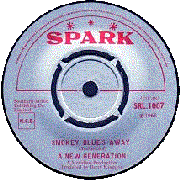 |
7" (1968) **½/½ Smokey Blue's Away She's a Soldier Boy |
Current availability:
Mellotron used:
A New Generation were a late '60s pop outfit led by Iain and Gavin Sutherland, later of Sutherland Brothers (& Quiver), whose last single (of three), Smokey Blue's Away, is apparently based on Dvořák's New World Symphony, although I'm afraid to say I didn't spot it. It probably works better in the classical idiom, to be honest, coming across as a little fey when turned into a rather sentimental song about a dog.
The single opens with Mellotron flutes, presumably from keyboard player Christopher Kemp, although that seems to be it for the release, despite rumours that it's also on the flip, the rather better She's A Soldier Boy. The A-side's available on Tenth Planet's The Electric Lemonade Acid Test, Volume 4 and possibly others, should you really feel the need to hear it.
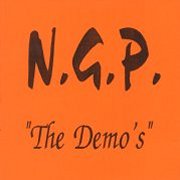 |
The Demo's (1994, recorded 1984, 65.38) ***/TTTPreludeMy Uncle Fool's Overture Fool's Journey Anguish The Ladder Circles |
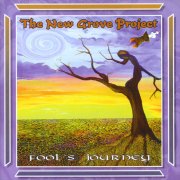 |
Fool's Journey (1996, 48.34) ****/TTT½PreludeMy Uncle Where am I Going From Here Decision Fool's Journey Anguish The Ladder |
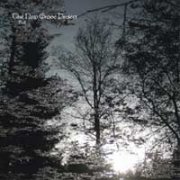 |
Brill (2005, 61.35) ****/TTNeon Light SubmissionThoughts Sui Generis The Sounding Flood The Light Within Laughternoon Dream Cool Fool Floating Brill |
Current availability:
Mellotrons used:
The story goes: Swedish musician Ingemar Hjertqvist wrote an album's worth of material in 1984 with his friend, keyboardist Per Sundbom, which they demoed using guitar, bass, synths, Mellotron and drum computer. As you do. Hjertqvist subsequently got married and moved to Switzerland, where he eventually dug out his old demos and released them as, er, The Demo's [sic.], allegedly in a limited edition of three hundred, making it a minor collectable these days. Well, I have to say that I think he made a bit of a mistake in exposing them to the scrutiny of the prog world, to be honest; they sound like what they are; while the drum programming is OK, the sounds aren't and most of the keyboards (with one obvious exception) don't sound too hot, either. Basically, reasonable material, with a noticeable late-'70s Genesis/Yes influence, obscured by poor production values, although the rather clanky-sounding Mellotron brightens up most of the tracks, although it's used pretty sparingly.
Before releasing the demos, Hjertqvist had put together various lineups to play his old songs, but wasn't really happy with any of them. Eventually, he pulled several musicians together as a studio project, including The Flower Kings' Roine Stolt on guitars, Pär Lindh on keyboards and, startlingly, Jode Leigh of the superb England on drums. Unlike several things I've listened to lately, Fool's Journey is actually better than I remembered it, being sort-of neo-prog with a '70s feel, enhanced by the vintage instrumentation. The song structures are more interesting than many '80s outfits, with nice key changes here and there and an 'epic' feel to some of the material (My Uncle, for example), sadly absent in the work of the likes of Marillion. There's plenty of Lindh's MkV to be heard, particularly on My Uncle, with stacks of strings, plus flute and choir parts, although he's a little more restrained on some of the other tracks. Fool's Overture from the demos has been retitled Where Am I Going From Here and the Mellotron use between the two recordings is pretty inconsistent, but that's what happens when you rearrange material, I suppose. Anyway, all in all, a much better album than I'd thought, although the lyrics and vocals are a little suspect in places, but enough Mellotron for it to be considered a Mellotron Album proper.
Nine years on, Hjertqvist released his third (and, it seems, last) New Grove album, Brill. It's immediately apparent that things have changed in the interim; the style is noticeably different, far more piano work from either Jode Leigh (back again) or Pär Lindh (ditto). About the only real criticism I would make is in the vocal department; it's not that either Hjertqvist or guest singer John "Bo Bo" Bollenberg have bad voices, but the lyrics frequently don't scan too well, while the spoken-word The Sounding Flood doesn't work at all, although I see it was actually written by the only Englishman on the project. I'm splitting hairs; it's a good album, considerable thought put into both composition and arrangement, knocking spots off many of their contemporaries, notably one led by another Swede who are doing considerably better. Naming no names. Lindh's Mellotron work is even sparser than on Fool's Journey, with a brief string part on Thoughts Sui Generis, choir and strings on Bollenberg's Laughternoon Dream and a fair helping of strings on Brill itself. Speaking of which, the title track is a reworking of Circles from the demos, with lyrics added, finally exhausting that source of material.
See: Pär Lindh | England | Bollenberg Experience
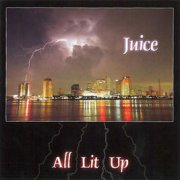 |
All Lit Up (2002, 57.23) ***/T |
|
| Back By the River What's Ahead Hey Kool Aid Rat Race My Neighbors Bum Song Cotton Gin Blues Song for You |
Another Love Song Special Nut Strut Black and Gold Stomp Further on Down the Road |
|
Current availability:
Mellotron used:
A level of confusion surrounds the name of this (now defunct) band. New Orleans Juice? New Orleans' Juice? Juice? I've seen all three used, while their debut, 1999's Fortified, puts 'New Orleans' at the top of the sleeve and 'Juice' at the bottom. Did they add their hometown name to avoid a lawsuit/confusion with another outfit? 2002's All Lit Up's sleeve merely credits them as 'Juice', but they stay here until/if I'm told otherwise by a respectable source. The band emerged from the local jamband scene, apparently, although All Lit Up is more of a soul/blues album, influenced by The Meters et al. Unfortunately, the album's a good fifteen minutes too long for its content (a regular jamband issue, I'd imagine), better tracks including the jammed-out Hey Kool Aid and Another Love Song.
Charlie Dennard plays choppy Mellotron flutes on the bluesy Song For You, sounding real enough to be... real. Unusually, this started off irritating me, then ended up earning my grudging respect. Good at what it does, pity there's so much of it.
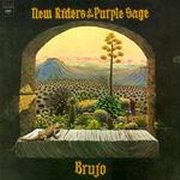 |
Brujo (1974, 33.04) ***/T |
|
| Old Man Noll Ashes of Love You Angel You Instant Armadillo Blues Workingman's Woman On the Amazon Big Wheels Singing Cowboy |
Crooked Judge Parson Brown Neon Rose |
|
Current availability:
Mellotron used:
New Riders of the Purple Sage started life as a country-rock Grateful Dead side-project, although no Dead members play on Brujo. They cover various country styles on the album, including a reasonable dose of humour in Singing Cowboy, although the shamelessly sentimental rural-centric Old Man Noll gets things off to a rather cheesy start.
Guest Ed Freeman plays understated Mellotron strings on Parson Brown and slightly more upfront ones on Neon Rose, but that's it on the Mellotron front. Anyway, most certainly not a Mellotron album, but, despite my general dislike of the genre, a pretty good country-rock effort, especially Buddy Cage's excellent pedal steel work.
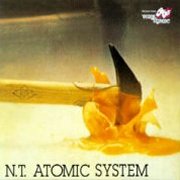 |
New Trolls Atomic System (1973, 40.40/44.11) ****/TLa Nuova Predica di Padre O'BrienHo Visto Poi Tornere a Credere Una Notte sul Monte Calvo Ibernazione Quando l'Erbe Vestiva la Terra Butterfly |
Current availability:
Mellotron used:
New Trolls Atomic System were an offshoot of the New Trolls, one of Italy's best-known progressive outfits. A messy split between the two main members lead to an uneasy compromise where the splinter faction were known as 'N.T. Atomic System', although initial copies of the album had a sticker on the front with the full name... While the New Trolls were sporadically good, New Trolls Atomic System is a stormer of an album, radiating energy, although it's no great surprise after hearing it to discover that their sole follow-up, Tempi Dispari, was full-on fusion. Basically, there isn't a bad track here, although the band moves through various tempos and moods; in fact, I'd go as far as to say that this is possibly better than anything by their parent band, though I know many readers will disagree.
Renato Rosset played the bulk of the album's keyboards, although both guitarist Vittorio de Scalzi and saxophonist Giorgio Baiocco chipped in, too. Rosset played the minimal Mellotron on offer here, with a very audible cello part, of all things, on opener La Nuova Predica Di Padre O'Brien, with more of the same on Tornere A Credere, but that appears to be it, as the album's flute parts, even the polyphonic ones, appear to be real. Una Notte Sul Monte Calvo is that rather unusual thing, a vinyl bonus track, a single added to later pressings of the LP and carried over onto the CD version. It's actually yet another adaptation of Mussorgsky's Night on Bare Mountain, if somewhat shorter than the other two that spring to mind.
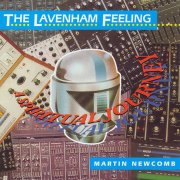 |
The Lavenham Feeling (1997, 58.19) ***/TT½Swift AwakeningStatic Forest Dreams Le Meridean The Lavenham Feeling Annabelle Whispers Expectations Eternal Memories Wilderness |
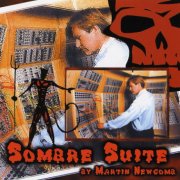 |
Sombre Suite (1999, 60.12) ***½/TTPart 1Part 2 Part 3 Part 4 Part 5 Part 6 Part 7 Part 8 |
Current availability:
Mellotrons used:
Martin Newcomb owned the Museum of Synthesizer Technology in the '90s, an unbelievable collection of over three hundred mostly analogue synths, although the public stayed away in droves. It's exactly the kind of place I'd visit, only, in those pre-Internet days, I had only the vaguest idea it existed, never mind its location. He eventually sold most of the collection off, keeping a few of the most desirable items, which he incorporated into the confusingly-named Museum Studio, itself now seemingly defunct. According to Discogs, he made four albums over a six-year period, the first two (both recorded post- the museum) featuring the studio's two Mellotrons.
1997's The Lavenham Feeling is, of course, an EM record, much of it sounding like various sequencers attached to various modular synths, including at least one Moog. It's all perfectly efficient, but, dare I say, Newcomb was more a collector than a musician? The album's probably at its best on the nice 'soundtracky' chord changes in Annabelle Whispers, while Static Forest features some interesting synth effects, but this is never going to be a genre classic. Newcomb owned M300 and M400 Mellotrons, the choirs from the latter used on almost all highlighted tracks, with what sound like M300 strings on the title track, Annabelle Whispers and Expectations, although the choirs on Le Meridean and Eternal Memories are clearly the listed Roland VP-330 vocoder.
'99's Sombre Suite is similar, if rather more cohesive, highlights including the ripping MiniMoog solo in Part 5 and the meditative Part 6. The equipment listing this time round not only specifically lists M300 and M400 Mellotrons, but also an impossibly rare Birotron B90, frequently difficult to pick out of a mix. Anyway, we seem to get high M300 strings on Part 1, Birotron choirs and Mellotron flutes on the lengthy Part 2, M400 flutes on Part 3 and M400 choirs and flutes (and M300 strings?) on Part 6, although the choirs go way below the instrument's range, making me think some manipulation was involved, possibly the listed Bode Frequency Shifter. Newcomb's albums are hard to find (at the time of writing, there are precisely zero copies of either of these for sale on Discogs), but fans of EM or rare-as-rocking-horse-shit analogue keyboards (or both) should possibly apply.
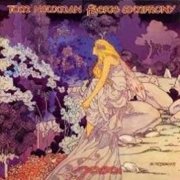 |
Faerie Symphony (1977, 31.57) ***½/T |
|
| The Woods of... Fordin Searchran Bean Si Little Voices of the Tarans The Fluter The Seelie Court The Spell Breaks The Fairy Song |
Dance of Daoine Sidhe Memories of Cúichulainn Aillen Mac Midna The Unseelie Court The Woods of... |
|
Current availability:
Mellotron used:
For those not in the know, Tom Newman engineered one of the biggest-selling albums of the '70s, Mike Oldfield's Tubular Bells, at Virgin's Manor Studios, working with Oldfield on many subsequent releases. Despite (because of?) being a member of famously obscure psychsters July, Newman's solo work has never gained any real success, which hasn't stopped him releasing a good few albums over the years, of which the best-known is probably 1977's Faerie Symphony. As with Anthony Phillips' The Geese & the Ghost or The Intergalactic Touring Band's eponymous effort, 1977 wasn't a vintage year for prog in the UK (England's mighty Garden Shed being the obvious exception), or at least, wasn't a good time to release something as intricate as Newman's magnum opus. It's actually a pretty decent album, all instrumental, utilising Celtic themes with abandon before they became de rigeur, shifting through various styles, from the relatively contemporary to Medieval, not to mention The Unseelie Court's blistering guitar solo.
Newman plays Mellotron on closer The Woods Of... himself, with a flute part that almost fools the ear into thinking it's real. Despite myself, I actually quite like Faerie Symphony, even if it's the kind of vanity project I should despise. It was clearly assembled with a lot of love and probably little expectation of great sales (I'm sure, as a producer, Newman had some idea of what was going on musically at the time) and could've been so, so much worse. Amazingly, it was actually released on CD in 2009 by those nice people at Esoteric, so you can get out there and hear it for yourself.
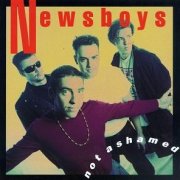 |
Not Ashamed (1992, 42.09) */T |
|
| I Cannot Get You Out of My System I'm Not Ashamed Where You Belong/Turn Your Eyes Upon Jesus Upon This Rock Strong Love Dear Shame Boycott Hell We Come Together |
Love Comes True Lost the Sky Again |
|
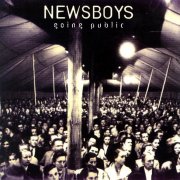 |
Going Public (1994, 36.39) */½ |
|
| Real Good Thing Shine Spirit Thing Let it Rain Going Public Truth and Consequences Lights Out Be Still |
When You Called My Name Elle G. |
|
Current availability:
Mellotrons used:
The Newsboys are a truly grim proposition; not only is the Aussie-via-the-States band's music (going by 1992's Not Ashamed) the worst kind of pseudo-'modern rock' going, but they're Christians, too, meaning that the album's entire lyrical content consists of the usual, tired old single-issue tosh about their god (note small 'g'), ignoring anything as tedious as real life. Musically, they seem to've been influenced, at least at the time, by U2 and maybe Midnight Oil (well, they are Aussies), with a horrible '80s-hangover production job, full of nasty 'dance-lite' beats and crummy samples, the only plus point being reasonable Hammond use, although it's a definite case of 'too little, too late'. Particular horrors include the schlocky balladry of Where You Belong/Turn Your Eyes Upon Jesus, the attempt at dancefloor rhythms in the ludicrously-titled Boycott Hell (yeah, right) and the shitty choir samples in Dear Shame, but it's all bad, really.
The reason I sat/skipped through this drivel was, of course, its Mellotron content, at a time when the Mellotron was still at a pretty low ebb, which is about the only positive thing I can think of to say about this awful record. John (Mark) Painter plays a nice flute part on Where You Belong/Turn Your Eyes Upon Jesus, but I'd be lying if I said it improved the song in any meaningful way. Please don't go anywhere near this album, on the remote offchance you might have been thinking of doing so. Everything about it, from its vile sleeve through its faceless, second- (third-? Fifth-? Nineteenth-?) hand music to its pointless lyrical platitudes are only going to offend those who like well-crafted, interesting music with something to say for itself. Avoid, avoid, avoid.
Just when you thought it was safe to go back in the water... They followed up with '94's Going Public, every bit as cruddy as its predecessor, possibly at its least bad on the rocky Lights Out. Worst tracks? Er, all of them? Let It Rain and Be Still might just be worse than everything else, but there's not much in it. Painter or Phil Madeira plays Mellotron, if only just, with a brief burst of strings on Spirit Thing. Seriously, don't bother. Incidentally, I've just discovered that their third album (from 1990) was called Hell is for Wimps. I mean, it's just childish, isn't it? Pathetic playground taunting of those who refuse to live in the theist's fantasy world. Just fuck off.
See: Paul Colman
 |
Divers (2015, 51.53) ****/TT |
|
| Anecdotes Sapokanikan Leaving the City Goose Eggs Waltz of the 101st Lightborne The Things I Say Divers Same Old Man |
You Will Not Take My Heart Alive A Pin-Light Bent Time, as a Symptom |
|
Current availability:
Mellotrons used:
Most of us became aware of harpist/pianist Joanna Newsom via her second album, 2006's Ys, a mad classical/folk/prog/indie/pop confection that shouldn't have worked in a million years, but did, assuming the listener wasn't put off by her slightly squeaky voice. Sounding familiar? I know it's a rotten cliché, but it's the law: every quirky female singer of the last four decades MUST be compared to Kate Bush. In fairness, Newsom's less Bushy than, say, Tori Amos, although the comparison has validity. To my surprise, despite having had a getting-on-for-twenty-year career, she's only released four albums to date, 2015's Divers being the most recent, a set of shorter, (slightly) more accessible songs, possibly at its best on Leaving The City, Goose Eggs and the title track. She only plays harp on six of its eleven tracks, too; dare I say it could be used a little more?
Newsom plays Mellotron on three tracks; interestingly, two credits are for 'M400', the remaining one being 'MkII'. Where on earth did she source a MkII? It's quite clearly real... I'm struggling to work out what M400 sound Newsom uses on Leaving The City: one of the brass family, but not the MkII mixed brass, also turning up on You Will Not Take My Heart Alive, alongside the more familiar flutes. And that MkII on the title track? My guess, without any hard-and-fast information, would be the 'tibia organ', a sound I don't think I've heard used before. What a splendid album! I'm not sure why I haven't investigated Newsom's other albums before; an error I shall rectify post-haste.
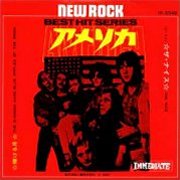 |
7" (1968) ***/TT America (Second Amendment) Diamond-Hard Blue Apples of the Moon |
Current availability:
Mellotron used:
Keith Emerson is noted for his deep loathing of the Mellotron, probably because you can't play honky-tonk piano on it or, in fact, show off at all, although his alleged reason is (get this) along the lines of (referring to the fact that it plays recordings of other musicians), "I don't like playing other people's music", or somesuch. What? It's quite surprising, then, that he deigned to play one on this b-side with the Nice, back in '68. Diamond-Hard Blue Apples Of The Moon is fairly typical for the period, without being particularly outstanding, with a rather cheesy brass melody (real, I think) and several Mellotron string interjections. It's available on various compilations and, I believe, reissues of their debut, The Thoughts of Emerlist Davjack, but I wouldn't buy anything specifically to hear it, to be honest. The A-side, America is a different matter, but that's another story...
The rumours that Emerson had one other brush with the Mellotron in his career have recently been disproved, principally by the man himself in a recent ELP bio. Allegedly, he persuaded Greg Lake to play a string line on Abaddon's Bolero, from Trilogy, although he wouldn't touch the hated instrument himself; in fact, it's a multi-overdubbed Moog line, so bang goes that theory. They apparently actually bought an M400 around the same period, loaded it with effects from either that album or Tarkus, then got Lake to trigger these onstage. This arrangement lasted exactly two gigs, until the Mellotron caught fire (!) and the experiment was abandoned. So what is it with '70s über-keyboard players and flammable Mellotrons, anyway?
See: Emerson, Lake & Palmer | Jackson Heights
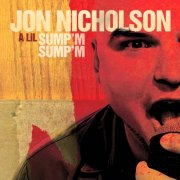 |
A Lil Sump'm Sump'm (2005, 43.35) ***/T |
|
| Just a Man Love is Alright Rock & Roll Grass River 7 Days Take Me Back Hero Stereo |
How Would I Know Nothing Grandma |
|
Current availability:
Mellotron used:
Wisconsin native Jon Nicholson's A Lil Sump'm Sump'm is a kind of rock/pop/soul crossover (sounds like Michael Jackson's career path in microcosm), clearly good at what it does, if not exactly this reviewer's thing. Best tracks? Probably the gentle How Would I Know and excellent closer (and apparently live fave) Grandma, a song about a ninety-two-year-old who's 'never been stoned' ("...bring it on, grandma's gonna fly...").
Nicholson (an accomplished keyboard player who writes on the instrument) plays what sounds like real Mellotron, with flutes on How Would I Know that enhance the song nicely, kind-of choking off at the end. My personal preference would be for more material like Grandma and less of the soul stuff, but I can't deny that Nicholson's a genuine talent.
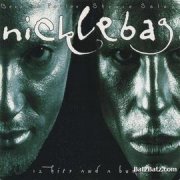 |
12 Hits & a Bump [a.k.a. Mas Feedback] (1996, 58.22) ***/T |
|
| Love Song (All Up in My World) Hit it and Quit it I Will Indanée Turning the Other Way Too Many Mountains (Big Daddy Mix) Sweet Thang Don't Know Why I Love You |
Grow Repetition Soul Search (Mother Mix) Win Hots on for Nowhere (Bump Track) Soul Search (Bonus Bump/Nicklebag Mix)/Indanée (Reprise) |
|
Current availability:
Mellotron used:
Nicklebag were a one-off collaboration between Tackhead's Bernard Fowler and Stevie Salas, whose sole album, 1996's 12 Hits & a Bump, was re-released the following year, with a revised tracklisting, as Mas Feedback. Unsurprisingly, given Salas' contributions, the album straddles the modern and 'trad' hard rock areas, a little funk thrown in for good measure, the end result sounding like an updated version of Hendrix' genre-crossing as much as anything. Top tracks include opener Love Song (All Up In My World), brief, drifting instrumental Indanée (and its uncredited reprise at the end of the album), the raucous Sweet Thang and an unusual Zeppelin cover, Presence's underrated Hots On For Nowhere.
Rei Atsumi (Vow Wow, Salas, Sass Jordan) plays Mellotron on Soul Search (Mother Mix), with nice flute and string parts, although I suspect Jeff Bova's Mellotronish choirs on a few tracks are samples. I don't know if this is still actually available in either of its versions, but Salas fans need to track this down promptly, while anyone into that '90s trad hard rock revival thing should probably give it a go.
See: Stevie Salas
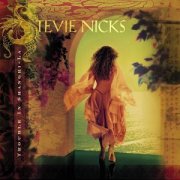 |
Trouble in Shangri-La (2001, 57.18) **½/T |
|
| Trouble in Shangri-La Candlebright Sorcerer Planets of the Universe Everyday Too Far From Texas That Made Me Stronger It's Only Love |
Love Changes I Miss You Bombay Sapphire Fall From Grace Love is |
|
Current availability:
Chamberlin used:
Trouble in Shangri-La was Stephanie "Stevie" Nicks' sixth solo album, twenty years after the first, Bella Donna, in between several joinings and leavings of Fleetwood Mac. It is, entirely unsurprisingly, soft rock par excellence, all assuming that you consider that to be an achievement. It is, of course, impeccably played and produced, although you can hear the ravages of the Coke Years in Stevie's voice; this is probably neither the time nor the place to reiterate the scurrilous rumours (Rumours! Geddit?) concerning exactly which mucous membrane Stevie chose to use after her nasal septum started disintegrating... On a more musicianly note, Tom Petty and various Heartbreakers appear, having collaborated several times before, both in the studio and on stage and brighten things up a little, though only a little, I'm afraid.
Heartbreaker Benmont Tench plays his Chamberlin on a couple of tracks, with a string part on Candlebright that's too clunky to be real, but too 'real' to be samples and more of the same, plus flutes, on Everyday. Given how inaudible the Chamberlin tends to be, it's remarkably audible here, although it could easily be on two or three other tracks, too. Anyway, this is a Stevie Nicks album, which tells you more about it than I ever could; squeaky-clean AOR is the order of the day, so don't expect any surprises. A little Chamberlin, but nowhere near enough to actually make this worth hearing.
See: Fleetwood Mac
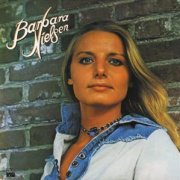 |
Barbara Nielsen (1975, 40.14) **/T½ |
|
| Landschap Zondagmorgen Elke Dag Maskerade Spel Zonder Plan Het is Pas Een Begin Quand il Pleut Een Hand Vol Zeewind |
Vandaag 'Tis Te Riskeren Uitvaart Amoureuse |
|
Current availability:
Mellotron used:
Pauline "Barbara Nielsen" Aarts is a Dutch actress, who presumably diversified into music in the '70s, releasing at least two albums, an eponymous one in '75 and Blijf Nog'n Beetje two years later. Barbara Nielsen is a pretty typical album of its time and place; mild, string-laden adult pop of the 'who on earth would wish to listen to this now?' variety. It's extremely professional, but a complete irrelevance, albeit nowhere near as bad as, say, BZN.
Unusually, Martin Agterberg's Mellotron (mostly block chords) on several tracks is generally placed next to real ones (arranged string parts), heard on opener Landschap, Elke Dag, Quand Il Pleut and 'Tis Te Riskeren, as far as I can ascertain, although it's some of the less essential use you might encounter. It's almost useless berating this album for being dull; it was aimed at a middle-aged audience nearly forty years ago, for whom lightweight MOR balladry was perfectly acceptable. In other words, this actually does what it does perfectly well, with a little Mellotron to boot, but that doesn't mean you either want or need to hear it.
(Czesław) Niemen (Poland) see: |
 |
The Night Watch (Italy) see: |
 |
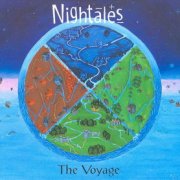 |
The Voyage (1996, 62.31) ***/TT½ |
|
| Departure On the High Seas Morning Light Eventide Wandering Moon Endless Days Distant Encounter |
Conflict (including The Battle and March of the Dead) Remembrance The Voyage Home |
|
Current availability:
Mellotron used:
The Milwaukee-based Nightales grew out of another local act, Paragone, sharing several members and apparently not sounding dissimilar, in a '90s prog kind of way. Actually, more in a laid-back, Camel-esque kind of way, had they been fully instrumental (perhaps they should've been), or maybe Pink Floyd. Yeah, more Floyd, I think. Unfortunately, on their sole album, 1996's The Voyage, memorable melodies seem to be at a premium, making way for the kind of cheeso synth solo heard on Endless Days (endless solos?), although comments like that do the album a disservice, as it's a perfectly pleasant listen for those used to prog's conventions (conventions? How did that happen?), just a slightly unengaging one.
Keys man Mark Walczak plays drummer Ken Lotz's Mellotron here and there, amongst his polysynth warblings and the album's guest woodwind players. Wandering Moon is essentially a Mellotron strings solo, Distant Encounter features some very upfront strings and Conflict has what sounds like Mellotron brass on its more upfront moments, making for a higher rating than I'd expected, to be honest. Most of the album's strings are generic synth, mind you, but it's nice to hear the real thing on a few tracks. Overall, then, a passable enough effort, but a bit bland for many progsters' tastes, I'll warrant, despite a few nice moments and some decent Mellotron work.
See: Paragone
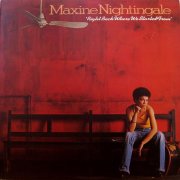 |
Right Back Where We Started From (1976, 46.43) **½/0 |
|
| Think I Want to Possess You Bless You Right Back Where We Started From In Love We Grow Gotta Be That One One Last Ride Reasons If I Ever Lose This Heaven |
Love Enough You Got the Love Life Has Just Begun Everytime I See a Butterfly Goodbye Again |
|
Current availability:
Mellotron used:
By the time Maxine Nightingale was persuaded to record Right Back Where We Started From, in 1975, she had already had one career in music, between 1969 and '73 and had moved to Germany to start a family. The soul-cum-funk-cum-glam rock stomper(!) was a bit hit in the UK and even bigger in the States, prompting her record company to finance an album in '76, named (unsurprisingly) for the hit. It starts well, with the offbeat funk/pop of Think I Want To Possess You, but soon degenerates into a rather ordinary effort, shifting between uptempo numbers that aren't as catchy as the title track and generic soul ballads, although One Last Ride and You Got The Love are better than average.
Lynton Naif is credited with Mellotron on Life Has Just Begun, a mid-tempo track that doesn't really go anywhere, but I'd love to know what he actually plays, as the (credited) flute on the track is clearly real. Anyway, Right Back Where We Started From seems to've been released on CD, but isn't going to be easy to find. One for mid-'70s soul fans, I think.
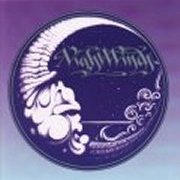 |
Nightwinds (1991, recorded 1979, 45.52) ****/TT½We Were the YoungCrude Exports Ivy The Pirates of Rebecca's Choice Out'n'About Sad But True As the Crow Flies The Curious Case of Benjamin Button |
Current availability:
Mellotron used:
Nightwinds were one of the distressingly lengthy list of bands who recorded an album, then split up before they could release it; unlike other unluckier outfits, though, it finally came out a decade after their demise on US label The Laser's Edge. Although a little derivative, Nightwinds is actually well worth hearing; think a cross between Styx and Saga, with bits of UK thrown in for good measure, not to mention Genesis (As The Crow Flies) and Yes, although their influences are more wide-ranging than that. Saga were obviously particularly high on their list of fave bands (they probably played on the same bill more than once), with closer The Curious Case Of Benjamin Button (from F. Scott Fitzgerald's 1921 short story) being a spot-on copy of Saga's lyrical style of the time, although Nightwinds were probably more retro, despite their 'modern' use of synths. No bad tracks here, The Pirates Of Rebecca's Choice and Out'n'About being particularly good; the album only gets docked another half star for its lack of originality, which isn't necessarily to criticise.
Gerald O'Brien's keyboard work is excellent throughout, with Mellotron on several tracks, although what sounds like a real string section confuses the issue in places. As a result, I think that's Mellotron strings on Crude Exports, while it's difficult to tell on We Were The Young, although the choirs on the track are most definitely tape-driven. None of the highlighted tracks are exactly laden with Mellotron, although there's reasonable use on Benjamin Button, probably as much choir as strings. Incidentally, Daniel (their machine's current owner) tells me that the third sound on their tape-frame was the apparently dreadful GC3 brass, although they don't (unsurprisingly?) appear to've used it on the album. So, although only a so-so Mellotron album, stick Nightwinds on your shopping list if US/Canadian progressive is up your street.
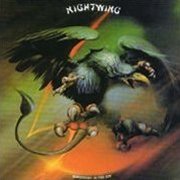 |
Something in the Air (1980, 39.15) ***½/TFantasiaNightwing Cold Love Edge of a Knife Something in the Air Barrel of Pain Boogie Woman You Keep Me Hanging on Fantasia Reprise |
Current availability:
Mellotron used:
Nightwing were put together by charismatic bassist/vocalist Gordon Rowley, ex-Strife, a Liverpool-based band who toured exhaustively throughout the '70s. They released two albums over the course of the decade, '75's Rush (occasionally confused with the band of the same name) and '78's Back to Thunder, featuring what has to be one the most stupid lyrics of all time in Feel So Good. Anyway, Nightwing were obviously Rowley's stab at real success, having a more commercial sound than his previous outfit, although their debut, Something in the Air, only shows glimpses of their eventual AOR style. The material varies wildly, from the pseudo-classical Fantasia and its reprise, through the workaday hard rock of Edge Of A Knife, the balladry of the title track, the tedious blues of Boogie Woman (nice title, chaps) to the lengthy cover of Vanilla Fudge's version of the Supremes' You Keep Me Hanging On.
Although the band's regular keys man was ex-Nutz member Kenny Newton (Nutz had simplified their approach by this point, eventually becoming Rage), the mysterious Berington van Campen played extra keys, as well as writing Fantasia. As a result, I assume it's him playing the Mellotron flutes on both parts of his piece, plus occasional choirs on You Keep Me Hanging On, although all the strings appear to be real. Nightwing went on to release several more albums, always occupying an odd, rather dead-end niche in UK hard rock circles, while finding some measure of success on the continent. I can't have played this album for twenty years and I certainly didn't expect to find any Mellotron work on it, so thanks to Mark for alerting me to its presence. Not a classic, but fans of the genre may find something here to interest them.